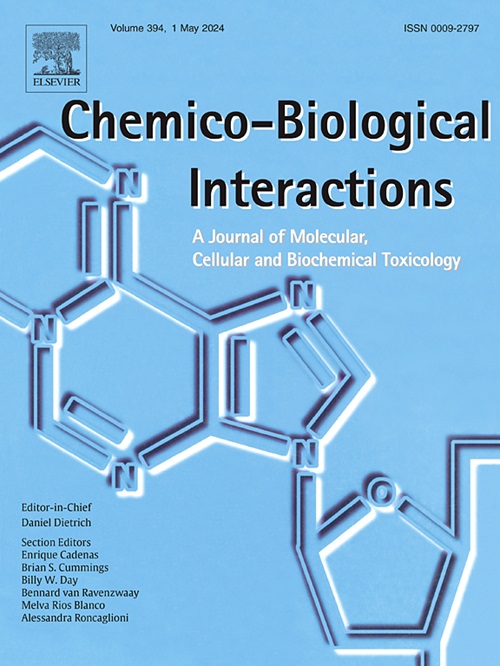由核分枝杆菌衍生的 3-吲哚丙酸通过激活巨噬细胞中的芳基烃受体促进结直肠癌进展
IF 4.7
2区 医学
Q1 BIOCHEMISTRY & MOLECULAR BIOLOGY
引用次数: 0
摘要
越来越多的研究表明,核梭杆菌(F. nucleatum)显著影响结直肠癌(CRC)的发生和进展。我们的前期研究表明,核仁梭菌通过激活芳烃受体(AhR)发挥促瘤作用。然而,其微生物代谢物在调节免疫反应中的作用尚不清楚。本研究首次报道了F. nucleatum-derived 3-吲哚丙酸(IPA)激活巨噬细胞AhR,驱动M2极化和促进肿瘤的免疫抑制。我们发现,核仁F. (CSF)培养上清液能有效激活巨噬细胞的AhR。在共培养系统中,CSF上调M2标记物CD206的表达,升高CD163、TGF-β、IL-10和VEGF的mRNA水平。在皮下同种异体移植模型中,CSF诱导肿瘤微环境中CD206+巨噬细胞数量增加,CD8+ T细胞数量减少,从而促进肿瘤生长。液相色谱-串联质谱分析(LC-MS/MS)显示,IPA是脑脊液中一种新的主要ahr激活代谢物。引人注目的是,IPA总结了CSF在体外和体内促进肿瘤细胞迁移和免疫抑制方面的作用。关键的是,AhR抑制剂CH223191可以抑制ipa介导的M2极化和肿瘤生长。我们的研究揭示了F. nucleatum衍生的IPA通过AhR激活重编程巨噬细胞以促进CRC进展的新机制,为CRC治疗和预后改善提供了潜在的治疗靶点。本文章由计算机程序翻译,如有差异,请以英文原文为准。

Fusobacterium nucleatum-derived 3-indolepropionic acid promotes colorectal cancer progression via aryl hydrocarbon receptor activation in macrophages
An increasing body of research indicates that Fusobacterium nucleatum (F. nucleatum) significantly influences the onset and progression of colorectal cancer (CRC). Our previous study has shown that F. nucleatum exerts pro-tumorigenic effects through aryl hydrocarbon receptor (AhR) activation. However, the role of its microbial metabolites in regulating immune responses remains unclear. Here, we report for the first time that F. nucleatum-derived 3-Indolepropionic acid (IPA) activates AhR in macrophages, driving M2 polarization and tumor-promoting immunosuppression. We discovered that culture supernatant of F. nucleatum (CSF) robustly activates AhR in macrophages. In co-culture systems, CSF upregulated the expression of the M2 marker CD206 and elevated mRNA levels of CD163, TGF-β, IL-10, and VEGF. In a subcutaneous allograft model, CSF induced an elevated number of CD206+ macrophages and decreased presence of CD8+ T cells within the tumor microenvironment, thereby promoting tumor growth. Liquid chromatography-tandem mass spectrometry (LC-MS/MS) revealed IPA as a novel major AhR-activating metabolite in CSF. Strikingly, IPA recapitulated CSF's effects in promoting tumor cell migration and immunosuppression, both in vitro and in vivo. Critically, the AhR inhibitor CH223191 abolished both IPA-mediated M2 polarization and tumor growth. Our study revealed a novel mechanism by which F. nucleatum-derived IPA reprograms macrophages through AhR activation to fuel CRC progression, providing potential therapeutic targets for CRC treatment and prognosis improvement.
求助全文
通过发布文献求助,成功后即可免费获取论文全文。
去求助
来源期刊
CiteScore
7.70
自引率
3.90%
发文量
410
审稿时长
36 days
期刊介绍:
Chemico-Biological Interactions publishes research reports and review articles that examine the molecular, cellular, and/or biochemical basis of toxicologically relevant outcomes. Special emphasis is placed on toxicological mechanisms associated with interactions between chemicals and biological systems. Outcomes may include all traditional endpoints caused by synthetic or naturally occurring chemicals, both in vivo and in vitro. Endpoints of interest include, but are not limited to carcinogenesis, mutagenesis, respiratory toxicology, neurotoxicology, reproductive and developmental toxicology, and immunotoxicology.

 求助内容:
求助内容: 应助结果提醒方式:
应助结果提醒方式:


